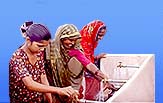/topics/storage-and-supply
Storage and Supply
Talk by Dr. Veena Srinivasan on 'An integrated framework for analysis of water supply in a developing world city', ATREE, July 6, 2011, Bangalore
Posted on 05 Jul, 2011 12:15 PMOrganizer: Ashoka Trust for Research in Ecology and the Environment (ATREE)
Venue: Auditorium, ATREE, Bangalore
Description:
Dr. Veena Srinivasan, researcher at the Pacific Institute, and an adjunct fellow at ATREE, will be presenting a talk on 'An integrated framework for analysis of water supply in a developing world city'.
Alternate management approaches for village water supply systems - Case studies from Maharashtra - A field note by WSP
Posted on 23 Jun, 2011 05:25 PMIt documents the approaches in a context where the state government agencies responsible for construction and management of rural water supply systems have been found to be facing limitations in O&M arrangements.
The traditional approach to provision of rural water supply in India has been supply driven, with emphasis on norms and targets and on construction and creation of assets, but with very little concern for sustainable arrangements for better management and maintenance of the facilities built. The viewpoint that users are ‘beneficiaries’ rather than empowered stakeholders among the service providers has led to alienation of the users.
Training announcement on ‘Water supply distribution modelling’, July 9, 2011, Pune
Posted on 19 Jun, 2011 04:01 PM Organizer: The Community Engineer
Organizer: The Community Engineer
Venue: Pune
Description:
Training will include presentations, work out problems, step to step guide to modelling and hands on experience in using the software.
Training focus on students/graduates, consultant, contractor, municipal/department engineers.
Water safety plan: A manual for pilot study areas of Hyderabad
Posted on 20 Apr, 2011 02:03 AMThe most effective means of consistently ensuring the safety of drinking water supply is through the use of a comprehensive risk assessment and management approach, that encompasses all steps in water supply from catchment to consumer. Such approaches are called Water Safety Plans (WSPs).
The aim of a WSP is to organize and systematize records of management practices applied to drinking water and to ensure workability of such practices to organized drinking water supply.
Guidelines for water safety plans for rural water supply systems - A document by SIAES and WHO India (2009)
Posted on 20 Apr, 2011 01:10 AM Delivery of safe drinking water is vital for protecting public health and of promoting more secure livelihoods.
Delivery of safe drinking water is vital for protecting public health and of promoting more secure livelihoods.
The traditional approach to water quality and safety management has relied on the testing of drinking water, as it leaves the treatment works or at selected points, either within the distribution system or at consumer taps. It is referred to as ‘end‐product testing’.
Application of Composite Correction Program for improvement in efficiency of water treatment plants - A WHO paper
Posted on 20 Apr, 2011 12:41 AMThe goal of safe and affordable drinking water and sanitation has not yet been achieved. The current practices of water purification are inadequate to produce secured water supply. Maintaining health protection at water supply systems has become more challenging with resistance of some pathogens to disinfection using chlorination and an increase in the immuno-compromised population (e.g., people with HIV, organ transplant patients, the elderly).
In this context, it has become essential to develop various tools such as Composite Correction Programme (CCP) and Water Safety Plans (WSP) to improve water purification and distribution systems, to achieve the goal of providing safe drinking water.
Resistance against the Polavaram dam - An EPW article
Posted on 19 Apr, 2011 11:02 PM
This EPW paper studies the various forms of resistance against the construction of Polavaram dam, and notes that the main feature of the struggles has been the involvement of people’s organisations due to the failure of traditional as well as statutory bodies, representatives and regional leadership of mainstream political parties.
Operation and maintenance for rural water supplies – A manual by Department of Drinking Water and Sanitation and the Water and Sanitation Program of World Bank
Posted on 17 Apr, 2011 07:23 AM This Operation and Maintenance (O&M) manual for rural water supplies by the Department of Drinking Water And Sanitation and Water and Sanitation Program of the World Bank complements their Gram Panchayat Handbook released in 2010 . It takes into account the current aspirations and challenges facing the sector, and builds on the framework already set out in the National Rajiv Gandhi Drinking Water Programme (NRDWP) and Strategic Plan 2011-2022.
This Operation and Maintenance (O&M) manual for rural water supplies by the Department of Drinking Water And Sanitation and Water and Sanitation Program of the World Bank complements their Gram Panchayat Handbook released in 2010 . It takes into account the current aspirations and challenges facing the sector, and builds on the framework already set out in the National Rajiv Gandhi Drinking Water Programme (NRDWP) and Strategic Plan 2011-2022.
Presentations from the Water India conference organised by Confederation of Indian Industry (2011)
Posted on 12 Apr, 2011 11:56 PMThe Confederation of Indian Industry (CII)organised the Water India conference, around the theme “Transforming the municipal and industrial water landscape - Issues, challenges and opportunities".
Groundwater use in Aurangabad – A survey and analysis of social significance and policy implications for a medium-sized Indian city by GW MATE and World Bank (2008)
Posted on 12 Apr, 2011 01:17 AMAurangabad, a city in central Maharashtra is in a drought prone region, and being a rapidly urbanising town, is facing a lot of pressure on ots water resources. Besides importing water there has been an increasing trend of ground water extraction.
In this context, a survey of groundwater use was conducted as part of a World Bank study on Indian groundwater management. The study was a collaboration between GW MATE(Groundwater Management Advisory Team) and GRASP (Grass Roots Action for Social Participation), an Aurangabad-based civil society organization working on community-based natural resource management.





